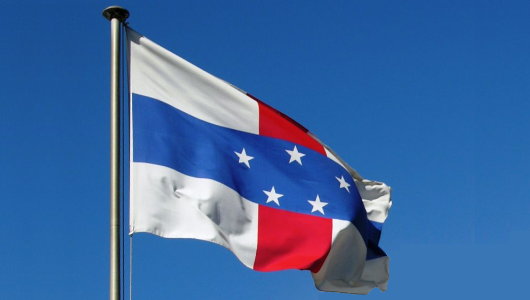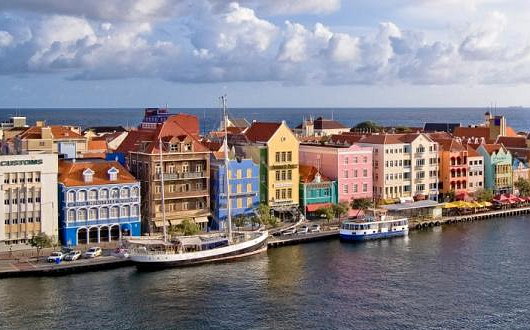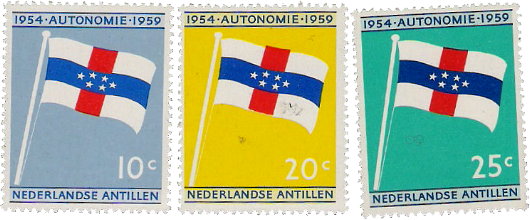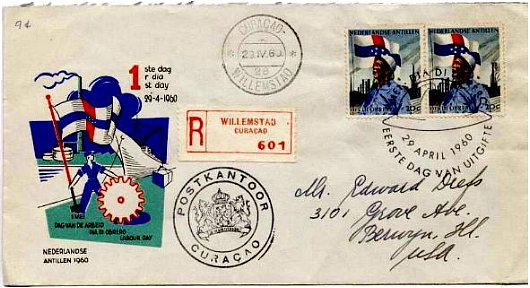
About Andrew Cusack
 Writer, web designer, etc.; born in New York; educated in Argentina, Scotland, and South Africa; now based in London.
Writer, web designer, etc.; born in New York; educated in Argentina, Scotland, and South Africa; now based in London. read more
News
Blogs
Reviews & Periodicals
Arts & Design
World
France
Mitteleuropa
Knickerbockers
Argentina
The Levant
Africa
Cape of Good Hope
Netherlands
Scandinavia
Québec
India
Muscovy
Germany
Academica

The End of the Antilles
The Netherlands Antilles is Dissolved
THIS MORNING, one  country disappeared, two more were born, a fourth was expanded, and all are part of a single kingdom. The Netherlands Antilles, the collective islands of the Dutch West Indies which since 1954 has formed a constituent country of the Kingdom of the Netherlands, was dissolved. Two of the islands in the archipelago, Curaçao and Sint Maarten, have become full constituent countries of the Kingdom (alongside Aruba, which was separated from the Antilles in 1986, and the Netherlands proper), while the islands of Bonaire, Sint Eustatius, and Saba (the ‘B.E.S.’ islands) have been merged into the Netherlands proper as special municipalities.
country disappeared, two more were born, a fourth was expanded, and all are part of a single kingdom. The Netherlands Antilles, the collective islands of the Dutch West Indies which since 1954 has formed a constituent country of the Kingdom of the Netherlands, was dissolved. Two of the islands in the archipelago, Curaçao and Sint Maarten, have become full constituent countries of the Kingdom (alongside Aruba, which was separated from the Antilles in 1986, and the Netherlands proper), while the islands of Bonaire, Sint Eustatius, and Saba (the ‘B.E.S.’ islands) have been merged into the Netherlands proper as special municipalities.
The government of North Holland has invited the B.E.S. islands to join the province, but this has not yet been agreed to. With a combined population of just 17,000, Bonaire, Sint Eustatius, and Saba do not have enough inhabitants to justify forming a single province of their own — the province with the lowest population at the moment is Flevoland at 356,000. North Holland’s offer may be turned down if it entails the complication of the three island-municipalities becoming part of the European Union. Currently all the islands of the Netherlands Antilles are outside the E.U., but all their citizens are E.U. citizens by virtue of being Dutch citizens.

The country status granted to Sint Maarten and Curaçao, like that of Aruba, does not entail independence, but rather a high degree of autonomy within the kingdom. The government of the entire realm maintains responsibility for sovereignty, defence, foreign relations, citizenship & nationality, orders of chivalry, shipping (excluding sail vessels), and extradition. The Estates of the Netherlands Antilles, the archipelagic parliament, has been abolished and the island councils of Sint Maarten and Curaçao have been elevated as the Estates of Sint Maarten and the Estates of Curaçao. Each island now has its own prime minister and cabinet responsible to the Estates.
Through this reorganisation, the Netherlands proper expands by an area of 124 square miles. At 2,877 feet tall, Mount Scenery on the island of Saba is the new highest point in the Netherlands, succeeding Vaalserberg in the province of Limburg (1,058 feet). The two official languages of the Netherlands, Dutch & Frisian, will now be joined by two more, Papiamento (spoken on Bonaire) and English (spoken on Sint Maarten). Dutch laws allowing abortion, same-sex ‘marriages’, and euthanasia will be applied to the new municipalities over the course of a two-year period. The Dutch minimum wage, however, will not be applied to the B.E.S. islands, to keep the cost of labour competitive within the Caribbean.

In an earlier article, I speculated that the Netherlands Antilles would be the next country to disappear from the roster of the Olympic Games (c.f. ‘Olympic Teams of Yesteryear’, 30 August 2010), given the expected dissolution of the entity. Before the dissolution, however, the Antillean Minister of Sport consulted with the five insular commissioners of sport and all unanimously agreed to continue fielding Olympians under a single flag. The Netherlands Antilles Olympic Committee agreed and the decision was ratified by the International Olympic Committee. While ‘the Netherlands Antilles’ will now refer to a region of the Caribbean instead of a country, it will for all intents and purposes be treated as the equal of any other entity with country status at the Olympics.
The Netherlands Antilles guilder (pegged at ƒ1 = US$1.79) will continue for the time being, but Bonaire, Sint Eustatius, and Saba will adopt the U.S. dollar as their official currency on January 1, 2011 while Curaçao and Sint Maarten will establish a currency union with a new ‘Caribbean guilder’ from 2012 onwards. Aruba introduced its own florin pegged to the U.S. dollar at the same rate as the Antillean guilder when it achieved its earlier separate status.

Search
Instagram: @andcusack
Click here for my Instagram photos.Most Recent Posts
- Amsterdam November 26, 2024
- Silver Jubilee November 21, 2024
- Articles of Note: 11 November 2024 November 11, 2024
- Why do you read? November 5, 2024
- India November 4, 2024
Most Recent Comments
Book Wishlist
Monthly Archives
Categories



Fascinating, beguiling, but profoundly absurd.
“Nations” with populations of a few tens of thousands. part of the Netherlands but with English as the official language and the American dollar as the official currency?
This is self-determination and Liberalism running mad.
But it is one final gasp of a failed ideology. The realities of Realpolitik will soon see an end to all of this, as the East continues its rise and the West continues down the destructive path it chose in 1914.
I’ve stayed in Willemstad in Curacao and Oranjestad in Aruba, and enjoyed both islands more than I expected to. I guess I expected that — except for Bermuda and parts of the Bahamas — visiting the Caribbean was for drunk frat boys and their female equals.
The Antilles though were very nice, a sort of weird tropical black Catholic version of the Netherlands. And a bit old-fashioned too — restaurants sometimes refuse to sit people wearing jeans and things like that.
You would like the architecture, which is alot like the Cape, but with more vibrant colors than the standard whitewash of those Cape Dutch houses.
This became sad reading for me, once I reached the fifth paragraph. What a mess the world is…
Yes, the Netherlands is one of the world leaders in killing off the elderly, the infirm, the sick, and the unborn.
A funny story: in 1979 I stayed with some already elderly Dutch relations in Baarn. He was then 80 years of age; she, 68. They proudly told me that they were members of the voluntary euthanasia society, the clear implication being that they were going to use the society’s resources when the time came. Well, sometimes ideas DON’T have consequences: he died eleven years later without being “eased over”; she, God willing, will celebrate her 99th birthday next month.
Moral of the story: the Dutch pride themselves on their liberal laws, but they don’t all that often actually live by them (their abortion rate, for example, is one of the lowest in Northern Europe).
I have heard that just this week, a perfect image of “Our Lady Help of Christians” appeared as a cloud formation in the sky above Curacao. This must mean that Our Lady will help somehow through the turmoil of these political changes.
Mr. Cusack-I know St. Agnes in NYC well-perhaps we can meet sometime-please keep in touch with me!